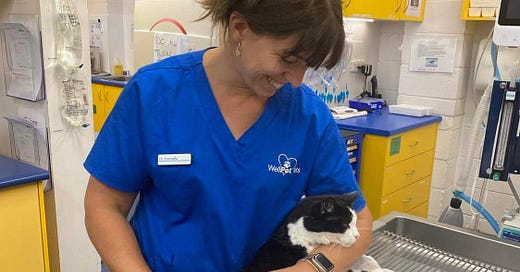Impostor syndrome - Email #12
Helping you through the AVE journey - Australasian Veterinary Examination
All the content included in this newsletter, including but not limited to text, graphics, logos, images, audio clips, and videos, is the copyrighted property of Antonella Pannunzio and Natalia Gomez unless otherwise indicated, and is protected by copyright laws. Any unauthorised reproduction, distribution, or modification of this newsletter's content is strictly prohibited and may result in legal action.
Hey Everyone! We are making some changes to our newsletter.
We have paused all paid subscriptions, and existing paid subscribers are not being charged during this time. If you have any questions, please don't hesitate to contact us 🙂
We are working hard and against the clock to provide you with better resources and opportunities to study for the AVE exam.
Our newsletter will continue every two weeks, sharing motivational and success stories. If you have any questions or need something specific, please let us know. We're here and happy to help!
↴
Have you ever felt you didn’t do well enough? Like you didn’t know enough? That what you have isn’t enough? I have 🙋♀️. Especially when I finished the AVE and started working with a full license in Australia. I though I didn’t deserve the job I got, that I didn’t have what it takes to work as a professional, and sometimes, I didn’t see myself as successful.
This feeling is called Impostor Syndrome, and I’m here to say you are not alone.
Impostor syndrome “describes high-achieving individuals who, despite their objective successes, fail to internalize their accomplishments and have persistent self-doubt and fear of being exposed as a fraud or impostor”
I’d like to share an abstract from a Journal called “The impostor Phenomenon” by J.Sakulku and J.Alexander. According to the journal, a person only needs a minimum of two characteristics in order to be considered as experiencing Impostor Syndrome
The impostor Cycle #1
This cycle starts when an achievement-related task, is assigned, and causes the fear of being found to be a fraud, leading to anxiety-related symptoms. When the task is completed whatever positive feelings of accomplishment are experienced, they are short-lived and not internalized as a success. Their success is attributed to either over-preparation or luck.
The Need to be Special, to be the very best #2
“Impostors” often secretly harbour the need to be the very best compared with their peers. Once enrolled in college or university they are now competing with other highly driven students and the “Impostor” is no longer at the top of his or her class. No longer believing they are exceptionally talented; they now dismiss their own accomplishments and devalue their educational attainment.
Superwoman/man aspects #3
The need to be the very best is also referred to as being perfectionistic, with high expectations that are unrealistic. They set high and almost impossible standards as their goals and for their self-evaluation. This leads to feelings of being overwhelmed, disappointed, and internalized feelings of being a failure.
Fear of Failure #4
For impostor making mistakes and not performing at the highest standard precipitates feeling of shame and humiliation. Therefore, to reduce the risk of possible failure, impostors then to overwork to ensure that they will not fail.
Denial of Competence and Discounting Praise #5
Impostor have difficulty internalising their success, they attribute their success to external factor. They do not accept positive feedback, instead focusing on what they did wrong.
Fear and Guilt about Success #6
It is related to the negative consequences of their success. Impostors fear success as they do not believe they will be able to replicate their accomplishment again or sustain the level of performance. Anxiety levels increase as they worry that higher demands or expectations from people around them
Some strategies to address Impostor syndrome during the AVE journey
Seek colleague-support by speaking with other veterinarians (We are here for you if you ever need to talk ✨)
Use positive self-talk 🍀
Remind yourself of past successes and accomplishments (Remember you are already a veterinarian! 🧑⚕️👩⚕️)
Replace perfectionism with realistic high standard: failure is going to happen at some point, but failure is also when growth occurs.
The impostor Phenomenon
MCQ practice - Australian Veterinary exam preparation
What type of cell has the following definition: The neutrophils of non-domestic species in which the cytoplasmic granules vary in staining reaction and size.
a. Blast
b. Myeloid
c. Reticulocyte
d. platelet
e. Heterophil
Answer: 1.E
🔊 Let us know if there is a specific topic you want us to review for the practical exam, and we will try to get it cover in the next newsletters 📨
Thanks for being a subscriber and support our work, stay tuned for more content in two weeks
Nat and Anto 🩺



